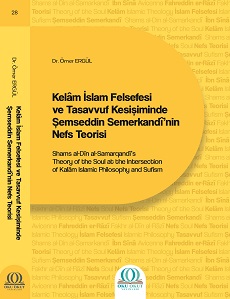Kelâm İslam Felsefesi ve Tasavvuf Kesişiminde Şemseddin Semerkandî’nin Nefs Teorisi
Shams al-Dīn al-Samarqandī’s Theory of the Soul in the Interaction of Islamic Theology Islamic Philosophy and Sufism
Author(s): Ömer Ergül
Subject(s): Theology and Religion, Islam studies, Philosophy of Religion, Contemporary Islamic Thought, Qur’anic studies
Published by: Oku Okut Yayınları
Keywords: Shams al-Dīn al-Samarqandī; Avicenna; Fakhr al-Dīn al-Rāzī; Islamic Theology; Islamic Philosophy; Sufism; Soul; Theory of the Soul;
Summary/Abstract: This study examines how Muhammad b. Ashraf al-Samarqandī deals with the classical theological theory asserting that the soul is a obscure body. The theory of the soul by Samarqandī represents a resistance against the abstract theory of the soul that began with Rāghib al-Isfahanī and al-Ghazalī and became widespread in later theological discourse. Another aspect of Samarqandī’s theory of the soul is his ability to blend certain elements of the abstract soul theory with the theory of obscure body. The theory of the soul by Samarqandī has emerged in the context of debates shaped by Fakhr al-Dīn al-Rāzī’s theory of the abstract soul and his criticisms regarding related issues. In this context, the study aims to elucidate the ground upon which al-Rāzī problematized issues related to the theory of the soul and to uncover the accumulation produced by Samarqandī on this basis. In this research, it has been observed that Samarqandī developed his system by reinforcing it with the following aspects, which are extensions of the concept of the abstract soul theory: bodily and spiritual perfection, distinction between sensory and rational perception, the view of internal senses located in the brain, and details regarding theoretical-practical intellect distinction. Furthermore, Samarqandī integrated Sufi elements related to asceticism and spiritual discipline into the theory in the context of the soul’s perfection. He accepts situations such as miracles and karamat as outcomes of spiritual attainment and endeavors to explain them on a rational basis as ordinary occurrences. It has been determined that Avicenna’s work, al-Isharat wa al-Tanbihat, holds a significant place at the core of Samarqandī’s synthesis attempt. On the other hand, it has been concluded that Samarqandī maintains general theological principles such as there is no eternal and abstract entity besides Allah, Allah is the agent who accomplishes His acts through His will, there is no necessary causality in the world, and the afterlife existence will involve a corporeal life in the unity of soul and body.
- E-ISBN-13: 978-625-98869-7-8
- Page Count: 137
- Publication Year: 2024
- Language: Turkish
- eBook-PDF
- Table of Content
- Introduction

